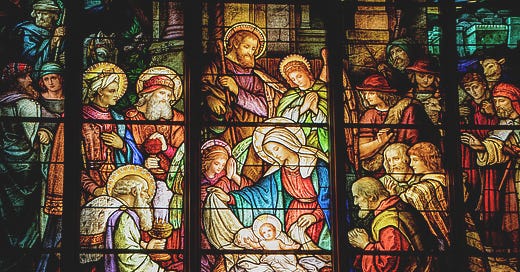In 1857, John Henry Hopkins Jr. of Christ Episcopal Church in Pennsylvania wrote a little song for a Christmas pageant. After a few years of performing it with family and friends, Hopkins officially published it in a collection of songs in 1863. Over the next few decades, “We Three Kings” gained worldwide renown as the first great American Christmas carol.
It’s easy to dismiss the song as mere fluff if you only know the first verse and the chorus. Many have pointed out that it is not even accurate to the biblical story, as the wise men were magi, not kings, and while there were three gifts, Scripture does not specify how many people brought them.
Nevertheless, the four proceeding verses are wonderful in both their theological depth and lyrical quality. I was reminded of that by this video from Pastor Mike Winger of biblethinker.org:
We three kings of orient are Bearing gifts we traverse afar Field and fountain Moor and mountain Following yonder star
The wise men came from the east. They were astrologers, studying the movement of the stars to determine the will of the gods. Something about the movement of this particular star made them believe that it signified the birth of not just a king, but one foretold by prophecy.
O star of wonder, star of night Star with royal beauty bright Westward leading, still proceeding Guide us to thy perfect light
Many have tried to figure out exactly which star they saw, but I think that’s a bit of a red herring. As my astrophysicist friend Sarah Salviander explains, the same God who created the universe could easily make a special star or light for this occasion that existed outside the natural order.
Born a King on Bethlehem's plain Gold I bring to crown Him again King for ever, ceasing never Over us all to reign
As Pastor Mike explained, the lyricist was careful to write that the gold was to crown Christ again. Jesus did not begin His existence in the stable in Bethlehem, rather he has existed, begotten of God the Father, since the beginning.
Consider also that the first people to celebrate Christ’s birth were not kings, priests, or governors, but shepherds and gentiles. The salvation of Jesus Christ is for all people, and was meant to be so from the beginning.
Frankincense to offer have I Incense owns a Deity nigh Prayer and praising All men raising Worship Him, God most high
Frankincense was used in Jewish temple ceremonies, where the priests communed with the very presence of God. Jesus is God in the flesh, a Deity nigh, which literally means God with us. As the Gospel of Matthew explains:
All this took place to fulfill what the Lord had spoken by the prophet: “Behold, the virgin shall conceive and bear a son, and they shall call his name Immanuel” (which means, God with us).
Matthew 1:22-23 ESV
Myrrh is mine its bitter perfume Breathes a life of gathering gloom Sorrowing, sighing, bleeding, dying Sealed in the stone cold tomb
Myrrh was a bitter substance that was used not only for medicinal and ceremonial purposes, but also to embalm the dead. Pastor Mike notes that myrrh appears twice in the story of Jesus: at His birth, and at His death. The story of Jesus is one narrative of sacrifice and salvation, and we cannot celebrate His birth without also anticipating His death and resurrection.
Glorious now behold Him arise King and God and Sacrifice Al-le-lu-ia, al-le-lu-ia Heaven to earth replies
”King and God and Sacrifice” sums up the three gifts: gold to crown Him again, frankincense signified the presence of God, and myrrh anticipated His death and resurrection. From a baby laid in a manger because there was no room in the inn to a Man of sorrows condemned to die on a cross, the story of Jesus is one of unlikely triumph. Despite what seemed to be a failed mission, He rose again, glorious and victorious. Our response as believers is to praise God and celebrate our deliverance from sin and death.
I wish you all a very happy Christmas time. May God bless you and your families, and I will see you again on Tuesday.




Merry Christmas, Brian! Thank you for all the beautiful writing and thinking in 2023. Looking forward to what's next.
Such a lovely video of "We Three Kings..."
Two of my favorite Christmas musical offerings: Handel's "Messiah" and "Amahl and the Night Visitors."
(We just finished playing jazzy Christmas carol duets on our recorders, a lovely way to celebrate the season.)